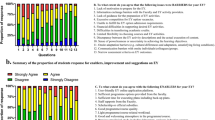Abstract
This study focuses on the dissonant study orchestrations of high-achieving university students. Advanced psychology students’ dissonant study orchestrations were compared with previous findings of advanced medical students orchestrations. Further, the relation of study orchestrations to study success was examined. The subjects were 28 advanced psychology students at the University of Helsinki, Department of Psychology who returned a task booklet of learning; of these, 24 students completed a questionnaire concentrating on the students’ interests, expectations and evaluation of the curriculum. All students were high achievers who had gone through a demanding selection process. The subjects completed three questionnaires concentrating on their study practices, conceptions of knowledge, expectations, and evaluation of the instruction in the Department of Psychology. The results showed that seven out of 28 students expressed a dissonant study orchestration. The results further showed that students’ individual study orchestrations were not related to study success. A comparison between advanced medical and psychology students showed that although the profiles of dissonant study orchestrations were technically similar among medical and psychology students, content analyses revealed that reasons for the development of dissonant study orchestrations were different.
Résumé
L’étude est centrée sur les dissonantes ‘orchestrations de leurs études’ par de bons étudiants d’Université. Les auteurs comparent les ‘orchestrations dissonantes’ d’étudiants avancés en psychologie à des résultats antérieurs d’étudiants avancés en médecine. Ils examinent ensuite les relations entre ‘orchestration des études’ et réussite dans les études. L’étude a porté sur 28 étudiants de psychologie avancés du département de psychologie de l’Université d’Helsinki ayant rempli un livret concernant leur approche de l’apprentissage, leur régulation et leurs conceptions de l’apprentissage. Parmi eux, 24 étudiants ont rempli un questionnaire concernant leurs intérêts, leurs expectations et l’évaluation de leur curriculum. Tous les étudiants étaient de très bons étudiants ayant été soumis à un processus sévère de sélection. Les sujets ont rempli trois questionnaires concernant leurs pratiques d’études, leurs conceptions de la connaissance, leurs expectations et l’évaluation de leur formation dans le département de psychologie. Les résultats montrent que 7 des 28 étudiants expriment une orchestration dissonante de leurs études. Les résultats montrent également que l’orchestration des études n’est pas liée à la réussite. La comparison entre les étudiants avancés de médecine et de psychologie montre que les profils d’orchestration sont techniquement similaires chez les deux catégories d’étudiants. En dépit de cette similarité, les analyses de contenu révèlent cependant que les raisons du développement de l’orchestration des dissonances dans les études sont différentes.
Similar content being viewed by others
References
Beishuizen, J., Stoutjesdijk, E., & van Putten, K. (1994). Studying textbooks: Effects of learning styles, study task, and instruction.Learning and Instruction, 4, 151–174.
Boekaerts, M. (1997). Self-regulated learning: A new concept embraced by researchers, policy makers, educators, teachers, and students.Learning and Instruction, 7, 161–186.
Entwistle, N., & Ramsden, P. (1983).Understanding student learning. London: Croom Helm.
Entwistle, N.J., Meyer, J.H.F., & Tait, H. (1991). Student failure: Disintegrated patterns of study strategies and perceptions of the learning environment.Higher Education, 21, 249–261.
Lindblom-Ylänne, S., & Lonka, K. (1999). Individual ways of interacting with the learning environment — Are they related to study success?Learning and Instruction, 9, 1–18.
Lindblom-Ylänne, S., Lonka, K., & Leskinen, E. (1996). Selecting students for medical school: What predicts success during basic science studies? A cognitive approach.Higher Education, 31, 507–527.
Lindblom-Ylänne, S., Lonka, K., & Leskinen, E. (1998). On the predictive value of entry-level skills for successful studying in medical school. Accepted for publication.Higher Education.
Lonka, K., & Ahola, K. (1995). Activating instruction — How to foster study and thinking skills in higher education.European Journal of Psychology of Education, 10, 351–368.
Lonka, K., & Lindblom-Ylänne, S. (1995, August).Epistemologies, conceptions of learning and study success in two domains; medicine and psychology. A paper presented at the 6th Conference of EARLI, University of Nijmegen, the Netherlands, August 26–31. Submitted for publication.
Lonka, K., & Lindblom-Ylänne, S. (1996). Epistemologies, conceptions of learning, and study practices in medicine and psychology.Higher Education, 31, 5–24.
Marton, F., & Säljö, R. (1976). On qualitative differences in learning. I — Process and outcome.British Journal of Educational Psychology, 46, 4–11.
Marton, F., Hounsell, D., & Entwistle, N. (Eds.) (1996).The experience of learning. Edinburgh, UK: Scottish Academic Press.
Meyer, J.H.F. (1991). Study orchestration: The manifestation, interpretation and consequences of contextualised approaches to studying.Higher Education, 22, 297–316.
Meyer, J.H.F. (1996). Some aspects on the individual-difference modelling of causal attribution.Higher Education, 31, 51–71.
Meyer, J.H.F., Parsons, P., & Dunne, T.T. (1990a). Individual study orchestrations and their association with learning outcome.Higher Education, 20, 67–89.
Meyer, J.H.F. Parsons, P., & Dunne, T.T. (1990b). Study orchestration and learning outcome: Evidence of association over time among disadvantaged students.Higher Education, 20, 245–269.
Perry, W.G. (1968).Patterns of development in thought and values of students in liberal arts college. A validation of a scheme. U.S. Department of Health, Education, and Welfare, Office of Education, Bureau of Research, Final Report, Project No. 5-0825, Contract No. SAE 8973, April, 1968.
Ramsden, P. (1988). Context and strategy. Situational influences on learning. In R.R. Schmeck (Ed.),Learning strategies and learning styles. New York: Plenum Press.
Ryan, M.P. (1984). Monitoring text comprehension: Individual differences in epistemological standards.Journal of Educational Psychology, 76, 248–258.
Vermunt, J.D.H.M. (1989).The interplay between internal and external regulation of learning, and the design of process-oriented instruction. A paper presented at the third Conference of the European Association for Research on Learning and Instruction, Madrid, Spain, September 4–7, 1989.
Vermunt, J.D.H.M. (1996). Metacognitive, cognitive and affective aspects of learning styles and strategies: A phenomenographic analysis.Higher Education, 31, 25–50.
Vermunt, J.D.H.M., & van Rijswijk, F.A.W.M. (1988). Analysis and development of students’ skill in self-regulated learning.Higher Education, 170, 647–682.
Vermunt, J.D., & Verloop, N. (1999). Congruence and friction between learning and teaching.Learning and Instruction, 9, 257–280.
Author information
Authors and Affiliations
Corresponding author
Rights and permissions
About this article
Cite this article
Lindblom-Ylänne, S., Lonka, K. Dissonant study orchestrations of high-achieving university students. Eur J Psychol Educ 15, 19–32 (2000). https://doi.org/10.1007/BF03173164
Received:
Issue Date:
DOI: https://doi.org/10.1007/BF03173164




